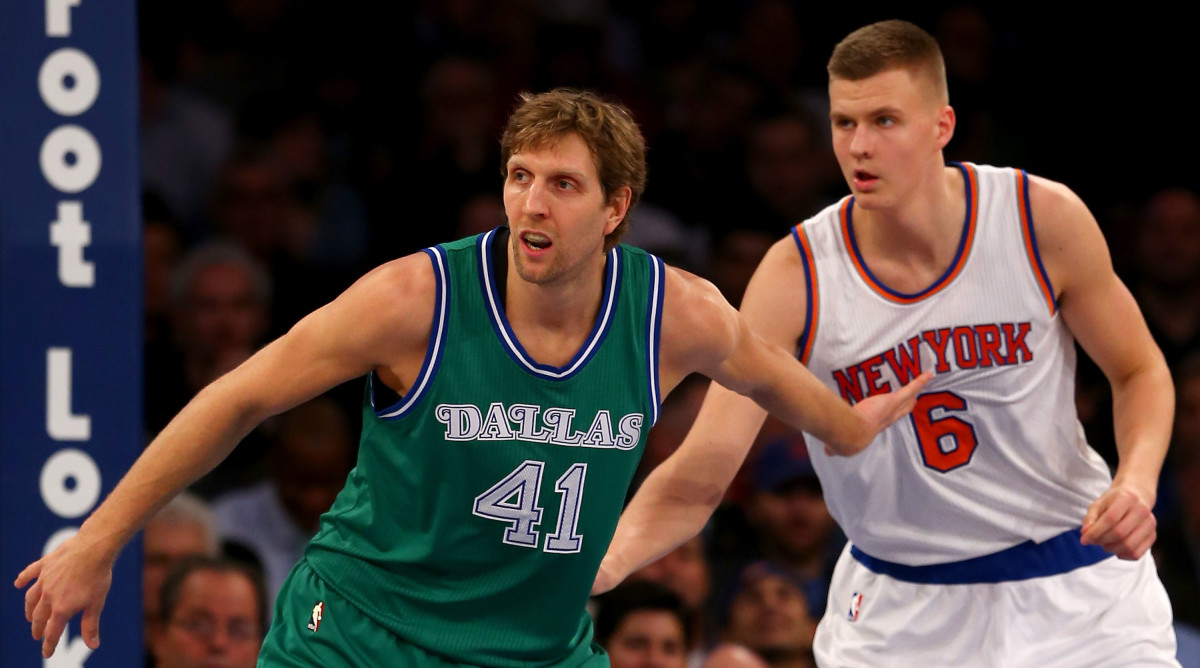By Trading for Kristaps Porzingis, Mavericks Sidestep the Rebuilding Issue

The trick of rebuilding in the modern NBA is understanding how long the rebuild should last. By its very structure, the league encourages borderline teams to be bad; the best way to acquire franchise-changing talent is through the draft, not only because of a weighted lottery system that rewards underperforming teams, but a contract structure that then gives those teams extended control over a drafted player’s career. The longer a team loses, the better their chance of rising up the ranks. Yet the people who actually make up an NBA team—many of them obsessively competitive—have a reflexive distaste for the process. It’s hard to stomach losing season after losing season, which makes it tempting to skip steps before there’s enough young talent in place to really justify it. Many a rebuild has crashed on the rocks of mediocrity after succumbing to the siren’s call.
By trading for Kristaps Porzingis, the Mavericks sidestep this issue almost entirely. It’s been clear for months that Luka Dončić presents his own sort of problem: that losing over any extended term just might not be possible with a player this good already on the roster. To find a proper running mate, then, would take some creativity. Here you have it. With only a single young player, two expiring contracts, and two future first-round picks, the Mavericks landed a 23-year-old All-Star to pair with their 19-year-old future All-Star. As it turns out, the most compelling thing the Mavericks could offer the Knicks wasn’t any player on its roster, but a willingness to take on contract debts owed to Tim Hardaway Jr. and Courtney Lee.
SHARP: Porzingis Trade Was Smart—Even If Knicks Don't Realize It
This is a move not without risk and one that Dallas still makes in a heartbeat. One of the most promising things about Dončić is that he can work alongside any kind of co-star. “He's the kind of player that could fit with any lineup, really,” Mavericks coach Rick Carlisle told Sports Illustrated in November. “He can play any one of four positions. Again, he has this unique feel for the game for a 19-year-old, to where you could put him out there with anybody and he would find a way to flow and move with the game and make it fun for his teammates. That's a very important skill to have.” The same could be said of Porzingis. To pair a creative, playmaking wing with a floor-stretching, shot-blocking big is as malleable as foundations get.
Where fit isn’t as much of a concern, talent acquisition becomes the priority. The luxury in having Dončić and Porzingis as cornerstone pieces is that it only enables the sort of opportunism that made Porzingis a Maverick in the first place. If the last week in the NBA has proven anything, it’s that the trade market for talented players is a fickle business. You never know who might come available, much less when. Dallas will be better off than most, if only because of this generosity of fit. Any sort of guard can play with Dončić, just as any sort of big could make sense next to Porzingis. This could be the start of a real and lasting contender, and somehow it took just three losing seasons—with frankly minimal trade assets—to manifest it.

Historically speaking, the Mavs have done quite well with value trades and budget signings to fill out their roster. Where they’ve whiffed is with the headliners; free agent after free agent has passed Dallas by, those first pursued to support Dirk Nowitzki and later to succeed him. If Porzingis returns to form (knee surgery has cost him this season so far), Dallas will be a two-star team for the first time in more than a decade. It can be dangerous to look too far into the future, though the Mavericks can at least entertain the thought of what their new Euro tandem might be able to accomplish over the next decade.
The first order of business, however, is ensuring that Porzingis stays a Maverick beyond next season. Before this trade was even formalized, Shams Charania of The Athletic reported that Porzingis—a restricted free agent this summer—intends to sign the qualifying offer, a one-year tender that would allow him to join the team of his choosing in 2020. Porzingis is not the first to claim this position, though few ever follow through. History tells us that players almost never turn down the kind of deal the Mavs will likely offer. To do so with his injury history at his size would be an unprecedented development.
Dallas is banking on the idea that caution will prevail, though that uncertainty is part of the risk. You can put Porzingis in a locker room with Dončić (who has name-checked his new teammate often this season, in reverence) and Nowitzki. You can drop a fat contract offer in his lap at first opportunity. Still, there are no guarantees—only probabilities. The same theory applies to the fact that Porzingis has played in just 63% of his team’s games in his four NBA seasons and has yet to return from a major knee surgery. If there were no risks—flight, injury, or otherwise—the Knicks wouldn’t have any reason to trade him.
So naturally, there are potential outcomes in play that turn out disastrously for the Mavericks. They now owe three of their future first-round picks as the cost of acquiring their two best players. Whatever flexibility they might have had was compromised by taking on Hardaway’s contract, already painful and made worse by a trade kicker. Nevertheless, you agree to this somewhat leveraged position, if you’re the Mavs, because high-end talent is the only way to go anywhere. Dončić was a way out. Porzingis, it seems, is the way forward.
